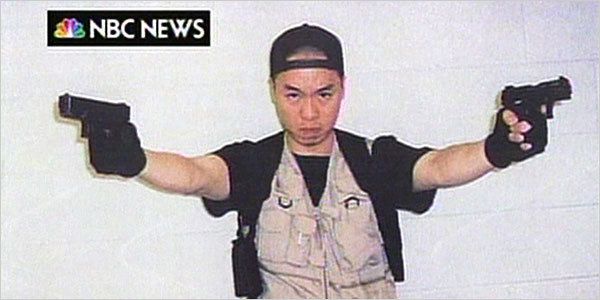


04/19/2007
Cho Seung Hui did not live the life he wanted. But on Monday, on the Blacksburg campus of Virginia Tech, Cho ended his life the way he wanted. And because of those two hours of slaughter and suicide, Cho attained the immortality he craved.
He carried out the killings — and we of the media did the rest.
A month from now, few Americans will remember who his victims were. But, decades from now, millions will recognize Cho’s face. When it pops up on a TV screen anywhere in America, they will ask, "Isn’t that the Korean kid who shot all those people down at Virginia Tech?"
Cho is now up there with Lee Oswald, Sirhan Sirhan, Eric Harris and Dylan Klebold. By documenting on videotape his rage, resentment and hatred of those he saw as persecuting him, and mailing it to NBC, Cho ensured the world would hear, in his words, why he did what he did. He ensured that we would see him as he saw himself, an implacable two-gun avenger of the injustices done to him.
Cho wanted to be certain his story would be told, and heard by America, in his own words. He succeeded. And out there in America, other loners, unable to connect or communicate, nursing grievances and grudges unknown, seeing a future not worth living, are going to look on the blaze of hideous glory with which Cho went out and say to themselves, better such an end than continuing on with this hateful life that I am leading to nowhere.
As Cho in his diatribe referred back to the killers of Columbine, future killers may reference him. Unable to be a part of a group, or unwilling to try, Cho now belongs to a rare community — of the most famous mass murderers of them all. Five times as many people were cut down in Cho’s spree as died in the St. Valentine’s Day Massacre by the gunmen of Al Capone. And the people who died at Blacksburg were all innocent. They were not the thugs and hangers-on of the North Side Gang of George (Bugs) Moran.
Though the 32 dead in Blacksburg were the victims of hate and evil, to some, the massacre was another argument for gun control. Yet, when one reporter began asking Virginia Gov. Tim Kaine the gun control question at a press conference, Kaine cut him off:
"Our focus is on the families and helping this community heal, so to those who want to try to make this into some little crusade, I say take that elsewhere. … For those who want to make this a political hobby horse they can ride, I've got nothing but loathing for them. … Let this community heal."
Indeed, Cho’s massacre is more of an argument that the legislature erred when it voted to make Virginia Tech a gun-free zone. When the madman came onto campus with his Glock and Walther, no one was there to stop him. Had a retired or off-duty police officer been in Norris Hall with a concealed weapon, lives might have been saved. For when the good guys with guns — cops — arrived and stormed the building, Cho shot himself rather than face armed men instead of unarmed students.
If there is a lesson to be taken away from this horror, it is that we, as a society, are becoming too tolerant of the aberrant. For, in retrospect, the signs Cho was a disturbed and dangerous young man, who belonged not on a campus but in an institution, are many.
He stalked one girl until she complained to police. He e-mailed another until she, too, went to police. Cho was taken to a psychiatrist, who concluded he was a "danger to himself and to others." He wrote plays for a creative writing class so full of hate and violence they alarmed one teacher to the point where she pressed him to get counseling. Another teacher had demanded and gotten his removal from her class.
Suite-mates in Harper Hall found him so uncommunicative they thought he could not speak English. All those who lived with him seemed to know about him is that he never spoke, turned away when spoken to, watched TV, worked his word processor incessantly and went to the gym.
Though he spent four years on campus, no one knew who Cho was, which bespeaks a larger point. Colleges have grown into city-sized universities of tens of thousands, and have ceased to be communities, even as the United States is ceasing to be a country, a nation and a people.
We are told that is a good thing. We are ever admonished to respect differences, to be tolerant of what we might think of as bizarre behavior. We are told that among the worst of sins is to be judgmental about how others behave.
Multiculturalism is what we are about. Diversity is our strength. All cultures, all people, all lifestyles are to be treated equally. At Blacksburg on Monday, we learned that there is such a thing as too much tolerance.
COPYRIGHT CREATORS SYNDICATE, INC.
Patrick J. Buchanan needs no introduction to VDARE.com readers; his book State of Emergency: The Third World Invasion and Conquest of America, can be ordered from Amazon.com.